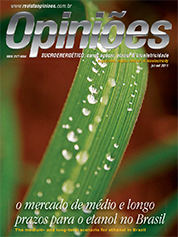Alessandra Fabíola Bernuzzi Andrade
Coordinator of the Environmental and the Bioenergy Councils of Abimaq
Op-AA-29
Intelligent solution for many generations
Ethanol is an extraordinarily intelligent solution for the future of many generations. It is effective, efficient and sustainable. Its cost is much more interesting than of all other automotive fuels. The existing technology is already able of reducing greenhouse gas emissions. The use of ethanol helped Brazil achieve self-sufficiency in fuel and energy. With the possibilities afforded by cellulosic ethanol, productivity would exceed 50%, allowing for its use in almost all regions of the world.
Thus, the importance of ethanol for Brazil is unquestionable. Its importance grows exponentially when we see ourselves in a world in which the “brown” economy must become aware of its need to make the transition to a “green” economy. Demand exists in a manner such as to influence the entire chain. For example, in the eyes of the machine and equipment industry, Brazil does in fact have special conditions to absorb the future demand of the sugarcane-based energy industry.
We have technology, innovation, competence and creativity, elasticity and experience. If we look at the chain as a whole, then such characteristics are added to the favorable conditions of climate, soil, existing technologies, all of which are increasingly allowing a higher mill productivity per hectare, making the competition process for food a faraway event.
Then there is the choice made by the consumer. The flex-fuel technology gave the consumer the power to make a choice. The market first demanded and then opted for ethanol, even given the variations in the fuel’s price. Thus, ethanol is in fact in quite a comfortable position. However, when we analyze its future, one must frown: is there really an intelligent strategic positioning in the form of a country plan for ethanol?
Our energy policy does not focus on the long-term. Today, right now, we can consider ethanol as the solution for 40 years. However, this does not hold in a medium- to long-term scenario.
We are talking about 100, 150 years. To work with goals for 10, 20 years, for example, is to make decisions now; undertake coherent policies and build on them today, in a short-term scenario. Ethanol is part of our history and positions itself as an extremely attractive product for domestic and also for international consumption.
But we must be careful. We have to be open to alternatives, mingle technologies, be alert to what is to come.The whole world is looking for new sources of energy generation.
Each country will get organized, will put energy security policies in place based on its local vocations. Some countries will import at an accelerated pace in the next two, three decades, diminishing the development speed of own technologies. Others will keep their imports at a steady rate.
However, at times we act as if Brazil had all the answers, as if all bottlenecks were eliminated. This movement is happening right now. There is a clear warning: we cannot miss the opportunity. We need to build on biomass as a source of energy. It is profitable, sustainable, even with the technology available today.
We are developing new technologies. Cellulosic ethanol from sugarcane will be even more profitable and competitive and may become an even more competitive source in the international market. With regard to the machine and equipment supplying industry for the ethanol industry and the ethanol production chain, we share the preoccupation that haunts the national production sector.
The first aspect is the “Brazil Cost”. The tax burden inhibits domestic investments and decreases our competitive potential in comparison with other economies, whether in terms of ethanol exports or as related to technology. The phenomenon of “de-industrialization”, already facing some economies, will have threatening consequences. Brazil has a market, it has an industrial base, it has technology and it is competitive.
We export machinery to Germany, a country in which the manufacture of machines with state-of-the-art technology is a matter of policy for the market and the State. But, until when? China, which is repeatedly breaking growth records, will still take a while to solve important domestic problems, particularly social ones.
But China will reorganize and when that happens, with the social and economic capital available, it may aim at the sugarcane-based energy industry. Will we be ready?
I believe the entrepreneurial forces of ethanol’s production chain are willing to face the challenges of the future, but what is not clear is Brazil’s position, that of its rulers, of the chain as a whole. How far should we go? What should our actual position be? The machine and equipment industry must also take part in this discussion, not only as a supplier, but as a collaborator, as a participant, with ideas and solutions.
Hence, we need this sign setting, but we really must develop the ability and the habit of planning for the short-, medium-, and long-term. We need an intelligent strategic vision. Ethanol has a lot to contribute to Brazil and the world.
We must, and we can take advantage of the moment to grow and transform ethanol into a fully sustainable form of energy, no longer as an alternative, but as a choice, an option. Just as millions of Brazilians did when they believed, and still do, in ethanol as a clean, sustainable, forthcoming and pioneer solution. An extraordinarily intelligent choice.




